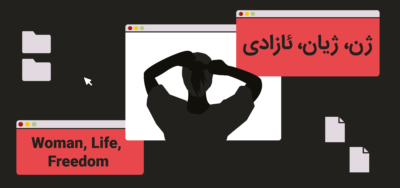Since the start of the protests which began following the death of Mahsa Jhina Amini in September 2022, Iran has hardly experienced a day without internet disruptions, which have resulted in two major developments:
- Efforts to advance the contents of the “User Protection” Bill, especially in relation to controlling bandwidth speeds, monitoring the use of VPNs and plans to advance legal VPNs.
- Small and medium telecommunication service providers, technology companies, and digital and online businesses have voiced concerns on their loss of income as a result of internet restrictions.
At first glance, these developments may not look related, however, they point to the increasing government control over the internet and furthering localization efforts aimed at decreasing the cost of internet restrictions.
According to details provided by news outlets and letters from the telecommunications service to the ICT Minister – which were hacked and released online – the financial cost incurred by the four biggest network providers as a result of the internet restrictions are:
- Shatel: 60% drop in traffic and 40% decrease in income
- MobinNet: 10 billion IRR (estimated 23,668.64 USD) loss in income
- RighTel: 14 billion IRR (estimated 33,136.09 USD) daily loss of income, and an approximate loss of 302 billion IRR (estimated 71,479.29 USD) in total
In light of Iran’s macro-policies regarding the internet, some of these losses will likely be recovered in the short to medium term through internet localization plans. However, one of the biggest obstacles to these plans remains the lack of enthusiasm and support for the use of domestic services and platforms such as messaging services, search engines, email services, and other core services that can make the National Information Network (NIN) fully operational. One of the reasons for this response is clear: concerns about privacy and government surveillance, which have made those inside Iran resistant to migrating to domestic services.
As a result, policies have been introduced to make domestic internet services more attractive compared to their international counterparts, effectively coercing users onto these services. Measures include discounts on domestic data use, providing banking or e-government service via domestic messaging apps, or holding online classes via domestic services. These efforts are supplemented by throttling access to international platforms such as Instagram, leaving Iranian internet users with little choice but to rely on domestic services to remain online and be able to access digital services which are now essential to everyone’s lives.
This report will focus on internet policy developments in Iran during November, much of which is focused on internet localization plans and the implementation of layered or tiered filtering in the country.
Plans for Iran-Russia Cooperation on Infrastructure
According to the Iranian news outlet, ISNA, on 23 November, Russian ICT officials traveled to Iran’s capital, Tehran, to meet with the ICT Minister, Eisa Zarepur to discuss cooperation between the two countries on infrastructure projects.
MPs Looking to Revive the Dangerous “User Protection” Bill
Mohammad Bagheri MP and member of the Joint Committee for the “User Protection” Bill said in an interview on 5 November that the Committee is “meeting tomorrow” but said that he was not “aware of the agenda.” While the “User Protection” Bill has taken a back seat on the parliamentary agenda, elements of the Bill have been approved by the Supreme Council for Cyberspace (SCC) and are slowly being enacted, however, it is clear that the threat of the Bill becoming law still persists.
Provision for “High Speed Internet Access” in New Regulation for “Supporting Freelancers”
On 22 November the government approved a new regulation for “supporting freelancers” which is aimed at providing various provisions for “verified” freelancers based inside Iran working in the IT sector or involved in the digital economy. The support includes “consultations on legal, insurance, and marketing matters,” among some other services. Most notably however, the regulation tasks the ICT Ministry with providing freelancers with “high speed internet” which signals the implementation of layered or tiered filtering. This system refers to different levels of internet access being given to different sections of society as approved by the government.
Iran’s Parliament Makes Progress on Adding Online Gambling to the Islamic Penal Code
On 14 November the Majles (parliament) approved an amendment to the Islamic Penal Code which defines online betting and gambling – which are already criminalized offline – and the penalties in relation to these activities online. The amendments will need to be approved by the Guardian Council before being passed into law.
New Head of the Communications Regulatory Authority Announced
On 8 November the ICT Ministry announced that Sadegh Abbasi Shahkouh has been replaced with Mohammad-Amin Aghamiri as the Head of the Communications Regulatory Authority (CRA) around a year after his appointment into the role, as per an order by the ICT Minister.
Iran’s ICT Minister Claims Domestic Online Businesses Remained Connected During Internet Shutdowns
In a meeting with a number of online businesses on 9 November, Iran’s ICT Minister Eisa Zarepour, claimed that despite severe internet restrictions such as internet shutdowns, throttling, and the blocking of platforms in previous months the situation was “managed” to “bring disruptions to a minimum, in a way that services relating to domestic use were able to function without any problems.” Zarepour’s claims come amid various reports from businesses such as network providers losing significant income as a result of internet disruptions as mentioned at the start of this report, and the introduction of government support packages for online businesses.
![]()
Iran Reportedly Unblocks ‘Google Discover’
On 14 November, the Iranian tech news website ZoomIt reported that authorities had unblocked Google Discover after blocking it earlier in the month.
A Number of Iranian Applications Reportedly Removed from the ‘Google Play Store’
According to the Iranian tech news website, Digiato, the Google Play Store removed a number of Iranian applications, such as the ride sharing apps Snap and Tap30 as well as messaging apps likeSoroush, iGap, and Bale from the app store between 15 and 16 November.
According to Digiato, companies behind these apps blame “sanctions” for the recent removal of the apps, although the website did not clarify which companies. No new technology related sanctions have been announced that would impact these apps specifically. However, in October, the Google Play Store’s Play Protect function (Google’s built-in malware protection for Android) blocked the Iranian social media app Rubika on the app store due to “security concerns.”
Iran Issues New Regulation for Cryptocurrency Mining
On 14 November a new regulation on crypto mining was issued by the Iranian government, legalizing crypto currency mining in Iran, which is to be regulated by the Ministry for Industry, Mine, and Trade.
Regulation for Supporting Online Businesses Issued; Efforts to Further Localize Services
On 1 November a new regulation for supporting online businesses and the digital economy was issued by the President, Ebrahim Raisi. In the new regulation, a series of supportive measures such as financial assistance, tax breaks, and licensing assistance, among other types of support were announced. The new online business support measures come largely in response to the latest wave of internet restrictions following the protests such as persistent internet shutdowns, but more significantly for businesses, the blocking of WhatsApp and Instagram by the authorities.
Iran’s ICT Minister: Businesses Using Domestic Platforms Dot Need Additional Licenses
On 7 November Iran’s ICT Minister, Eisa Zarepour announced that the “use of domestic domestic platforms by businesses is treated as those businesses having a commercial license,” meaning that businesses will not require additional licenses if they conduct their business via domestic platforms. This statement comes as many businesses have been facing additional pressures following the blocking of Instagram and WhatsApp and the continued internet shutdowns, and the continued use of incentives by the government to widen the use of domestic platforms and services instead.
Cloud Company “ArvanCloud” Sanctioned by the European Union
On 14 November the European Union sanctioned an Iranian cloud services company, ArvanCloud alongside 32 other Iranian individuals in response to the death of Mahsa Amini and the violent crackdown against protests by the authorities.
![]()
New University Disciplinary Bylaw: Closer Scrutiny of Student’s Online Activities
The Minister of Science, Mohammad-Ali Zolfigol, and the Health Minister Bahram Einollahi signed new disciplinary instructions on 28 November to be enforced by universities. The new bylaw instructs universities to closely monitor students’ online activities such as forming online student groups and associations, which are already banned offline, and will now also be considered a violation. The bylaw states that any online gathering of more than 100 students without an appropriate license will also be deemed a violation.
The new rules come following numerous protests and demonstrations taking place at schools and universities across the country since the current wave of protests which began in September.
![]()
Iran’s Space Organization Plans to Create Satellite Systems
On 24 November Hassan Salarie, the Head of Iran’s Space Organization under the ICT Ministry stated that the organization is working on plans to create “satellite systems” with the help of the country’s research institutes.
New Fiber Optic Project Starts in Iran
On 29 November the ICT Minister, Eisa Zarepour announced the start of a fiber optic project by ten network operators within ten provincial capitals and 65 cities. Prior to this announcement and earlier this year, the Majles (parliament) proposed a new bill for the expansion of fiber optic networks under which the government would allocate part of taxes paid by network operators to be made available to companies working in fiber optic related fields.




